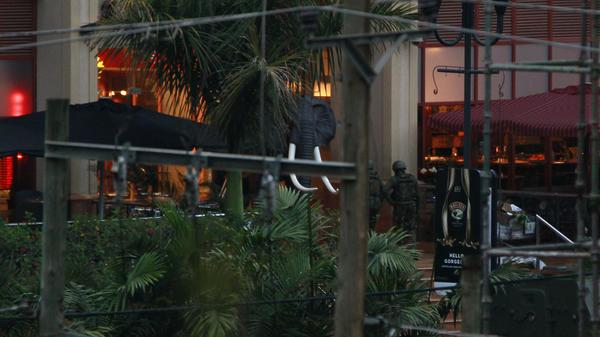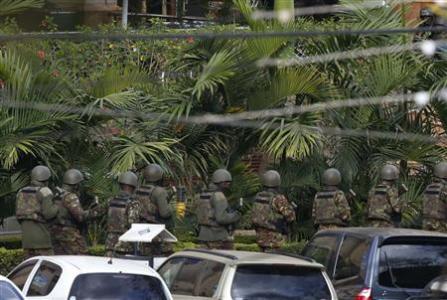www.aljazeerah.info
News, September 2013
Archives
Mission & Name
Conflict Terminology
Editorials
Gaza Holocaust
Gulf War
Isdood
Islam
News
News Photos
Opinion Editorials
US Foreign Policy (Dr. El-Najjar's Articles)
www.aljazeerah.info
|
Editorial Note: The following news reports are summaries from original sources. They may also include corrections of Arabic names and political terminology. Comments are in parentheses. |
Somali Fighters Attack Israeli-Owned Nairobi Mall, Demanding Withdrawal of Kenyan Forces from Somalia
September 23, 2013
 |
 |
| Al-Shabab attack on the Israeli-owned Westgate Mall in Nairobi, Kenya, September 23, 2013 |
Blasts shake Nairobi mall, smoke pours from building
By Richard Lough and Matthew Mpoke Bigg
Mon Sep 23, 2013 7:05am EDT
NAIROBI (Reuters) -
Powerful explosions sent thick smoke billowing from the Nairobi mall where militants from Somalia's al-Shabaab group threatened to kill hostages on the third day of a raid in which at least 59 have already died.
The blast was followed by other smaller detonations and volleys of gunfire but there was no indication of the fate of people whom the authorities say are being held by 10 to 15 Islamist gunmen who took the complex by storm on Saturday.
As troops ran into new positions, one security official told Reuters at the scene: "It is us who caused the explosion, we are trying to get in through the roof." He declined to be named.
Military spokesman Colonel Cyrus Oguna declined comment when asked whether security forces had set off the detonations or whether militants had set off explosives inside the building.
A plume of oily black smoke was still pouring from the building after half an hour.
A senior officer had said police were "closing in" on the militants after rescuing more trapped people overnight. But officials have been suggesting since Sunday that the siege may be near an end, while the guerrillas seemingly remain at large.
Interior Minister Joseph Ole Lenku said "a few" people were still hostage: "Our disciplined forces ... have been extremely careful to find the balance between neutralizing the attackers and getting as many people to safety as possible," he added.
A spokesman for al Shabaab, which has demanded Kenya pull its troops out of neighboring Somalia, warned they would kill hostages if Kenyan security forces, who are being assisted by Western and Israeli experts, tried to storm their positions:
"Israelis and Kenyan forces have tried to enter Westgate by force but they could not," Sheikh Ali Mohamud Rage said in an audio statement posted online. "The mujahideen will kill the hostages if the enemies use force."
On Twitter, the group posted: "As the operation gathers momentum inside #Westgate, the Mujahideen are for the 3rd day still in full control of the situation on the ground."
The Red Cross said on Monday that the death toll since Saturday's initial lunchtime bloodbath stood at 69. But Interior Minister Lenku said that was wrong and that only 59 were dead.
The Red Cross also said it had also recorded 63 people being reported by relatives as missing.
Survivors' tales of the military-style assault by squads of attackers hurling grenades and spraying automatic fire, has left little doubt the hostage-takers are willing to kill. Previous raids around the world, including at a desert gas plan in Algeria nine months ago, suggest they are also ready to die.
CINEMA
President Uhuru Kenyatta refused on Sunday to pull Kenyan troops out of Somalia, where they have pushed al Shabaab on to the defensive over the past two years as part of an African Union-backed peacekeeping mission across the northern border.
Asked on Sunday about whether captives had been wired with explosives, he declined comment. Kenyatta said all the gunmen were in one place. But a Kenyan soldier told reporters near the mall on Monday that the assailants and hostages were dispersed.
"They're in the cinema hall, with hostages. There are other terrorists in different parts," the soldier said. "They are on the upper floors, the third and fourth floors."
Previously, officials had indicated that the militants may have been grouped in a supermarket on the lower floors.
The president, who lost a nephew in Saturday's killing, vowed to hold firm in the "war on terror" in Somalia and said, cautiously, that Kenyan forces could end the siege.
"I assure Kenyans that we have as good a chance to successfully neutralize the terrorists as we can hope for," he said. "We will punish the masterminds swiftly and painfully."
It was unclear who the assailants were. Al Shabaab - the name means "The Youths" in Arabic - has thousands of Somali fighters but has also attracted foreigners to fight Western and African Union efforts to establish a stable government.
British Prime Minister David Cameron, confirming that at least three Britons were already among the dead, said: "We should prepare ourselves for further bad news."
U.S. President Barack Obama called Kenyatta to offer condolences and support.
Israel, whose citizens own stores in the Israeli-built mall and have been targeted in Kenya before, said Israeli experts were also helping.
As well as Kenyans, foreigners including a French mother and daughter and two diplomats, from Canada and Ghana, were killed. Ghanaian Kofi Awoonor was a renowned poet. Other victims came from China and the Netherlands. Five Americans were wounded.
Kenya's president, son of post-colonial leader Jomo Kenyatta, is facing his first major security challenge since being elected in March. The crisis might have an impact on his troubles with the International Criminal Court at The Hague.
Judges there let his vice president, William Ruto, fly home for a week, suspending a trial on Monday in which Ruto is charged with crimes against humanity for allegedly coordinating violence after an election in 2007. Kenyatta is due to face trial on similar charges later this year.
WARFARE
Western powers are alarmed by Islamist violence across Africa, from Nigeria in the west, through Mali, the Maghreb states in the north, to Somalia, and now Kenya in the east.
Al Shabaab's siege underlined its ability to cause major disruptions with relatively limited resources, even after Kenyan and other African troops drove it from Somali cities.
Al Shabaab's last big attack outside Somalia was a double bombing in Uganda that killed 77 people watching soccer on television in 2010. The Westgate assault is the biggest such incident in Kenya since al Qaeda's East Africa cell bombed the U.S. embassy in Nairobi in 1998, killing more than 200 people.
(Additional reporting by Edmund Blair, James Macharia, Duncan Miriri, Richard Lough Drazen Jorgic, Humphrey Malalo, Matthew Mpoke Bigg and Kevin Mwanza in Nairobi, Pascal Fletcher in Johannesburg, Feisal Omar and Abdi Sheikh in Mogadishu, Roberta Rampton in Washington, Anthony Deutsch at The Hague, Myra MacDonald in Tbilisi and Maayan Lubell in Jerusalem; Writing by Edmund Blair and Alastair Macdonald; Editing by Alison Williams and Giles Elgood)
=====================
Kenyan mall attack: How is Israel involved?
What’s the Connection Between Israel and the Kenyan Mall Attack?
Slate.com, By Joshua Keating
With news that Israeli advisors are helping Kenyan authorities formulate a strategy for ending the ongoing siege at a Nairobi shopping mall, readers might be wondering why, exactly, Israel is involved in all of this.
Despite the fact that the attack initially began nearly an Israeli-owned coffee shop within the mall and several Israelis escaped the assault, it doesn’t appear that this was connected to the attackers' motivations. “This time, the story is not about Israel,” a spokeswoman for the country’s Ministry of Foreign Affairs told the New York Times.
The initial suspicion that there might have been an anti-Israel motivation here seems reasonable in light of recent history. In 2002, 15 people were killed when terrorists bombed an Israeli-owned hotel in the resort city of Mombassa. The attackers also tried unsuccessfully to shoot down an Israeli jet. A previously unknown group called the Army of Palestine took credit but al Qaeda involvement was widely suspected at the time.
Though Kenya severed diplomatic ties with Israel after the 1973 Yom Kippur war and didn’t restore them until 1989, security cooperation has been growing between the two countries. In 2011, Israel pledged to provide security assistance to Kenya in its efforts to combat the Somali al-Shabab militants responsible for this weekend’s attack. "Kenya's enemies are Israel's enemies,” Prime Minister Benjamin Netanyahu said at the time. "We have similar forces planning to bring us down," concurred then Kenyan Prime Minister Raila during a visit to Jerusalem. Shabab leaders have also issued direct threats against Israel, though it’s not clear if they have the capacity to carry out attacks there.
Israel’s involvement in Eastern Africa as a whole has been growing. Israel is also believed to have been behind the bombing of a weapons factory in the Sudanese capital, Khartoum, last year. Netanyahu’s government has also sought to build ties with Kenya, Uganda, and newly-independent South Sudan. The AP reported last year that “Israel's Defense Ministry has given clearance for private Israeli security firms to operate in those nations, including some arms sales.” There were reports last month that Mossad was involved in investigating whether terrorism was involved in a fire at the Nairobi airport.
It seems quite possible that cooperation between the two countries may go beyond what’s been publicly reported.
PREVIOUSThe Attack on a Kenyan Shopping Mall May Be a Sign of al-Shabab’s Weakness, Not its Strength
Joshua Keating is a staff writer at Slate focusing on international news, social science, and related topics. He was previously an editor at Foreign Policy magazine. A transplanted New Yorker, he currently lives in Washington, D.C.
Fair Use Notice
This site contains copyrighted material the
use of which has not always been specifically authorized by the copyright
owner. We are making such material available in our efforts to advance
understanding of environmental, political, human rights, economic,
democracy, scientific, and social justice issues, etc. We believe this
constitutes a 'fair use' of any such copyrighted material as provided for
in section 107 of the US Copyright Law. In accordance with Title 17 U.S.C.
Section 107, the material on this site is
distributed without profit to those
who have expressed a prior interest in receiving the included information
for research and educational purposes. For more information go to: http://www.law.cornell.edu/uscode/17/107.shtml.
If you wish to use copyrighted material from this site for purposes of
your own that go beyond 'fair use', you must obtain permission from the
copyright owner.
|
|
|
|
||
|
||||||


